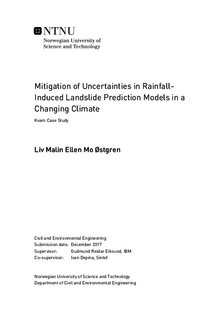Mitigation of Uncertainties in Rainfall-Induced Landslide Prediction Models in a Changing Climate - Kvam Case Study
Master thesis
Permanent lenke
http://hdl.handle.net/11250/2494539Utgivelsesdato
2017Metadata
Vis full innførselSamlinger
Sammendrag
One of the main challenges in providing consistent and accurate predictions of rainfall-induced landslides is the large uncertainty involved in the assessment. This thesis demonstrates the potential of an alternative approach in reducing uncertainties associated with rainfall-induced landslides by learning from observations of slope performances. The process is formalized by adopting the probabilistic Bayesian updating framework.
The performance of the implemented prediction models and the Bayesian updating framework is evaluated in a case study considering the landslide events that occurred in 2011 in the Kvam area of central Norway. Two types of landslide prediction models for slope stability under rainfall infiltration are implemented: simple analytical models and advanced sequentially coupled numerical models. Consistent trends between the models in terms of updated posterior probability density functions are observed.
The main contribution of this thesis is the implementation and demonstration of the updating framework in the described models. The results show that uncertainty in geotechnical and hydrological parameters controlling the occurrence of rainfall-induced landslides can be successfully reduced when the observation information in the updating process is constraining the outcome spaces of the random sample realizations. The parameters for which confidence intervals were reduced the most in the Kvam study were: soil thickness, groundwater table level, cohesion and friction angle. This indicates that these parameters are critical in the definitions of slope factors of safety in the implemented models. The effects of Bayesian updating on safety assessment of future rainfall-induced landslides is evaluated by simulating rainfall events of different return periods. The estimated probabilities of rainfall-induced landslide occurrence indicate that the strength of the updating information, in terms of constraining the random realization outcome spaces, and variation in rainfall return periods affects the estimated probabilities.
